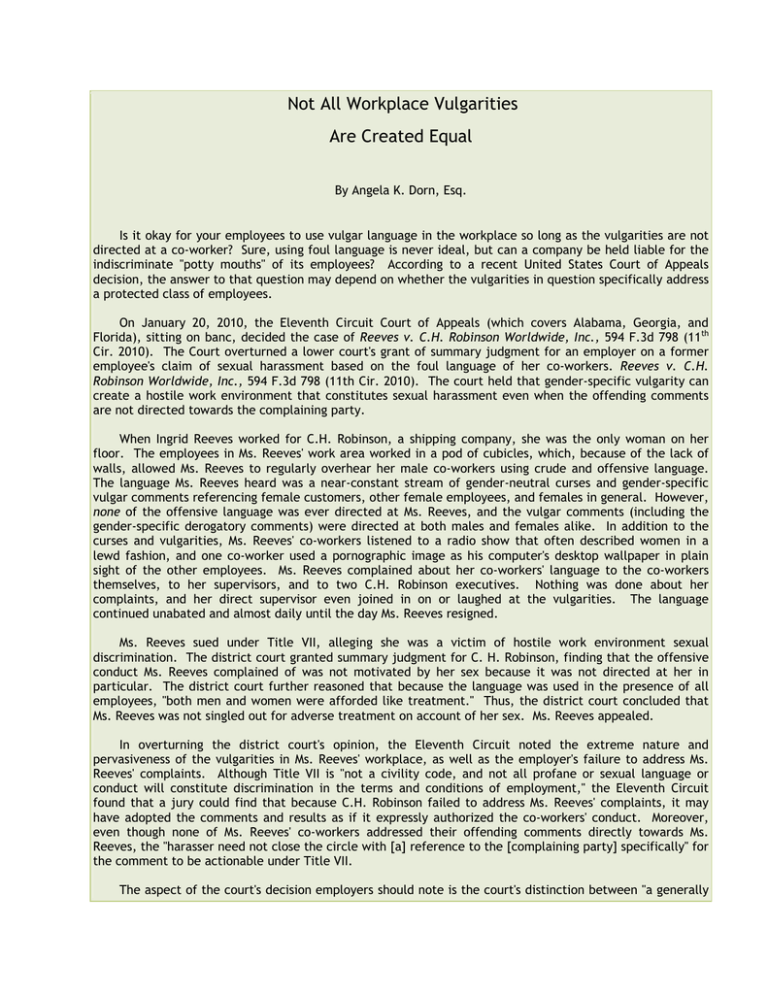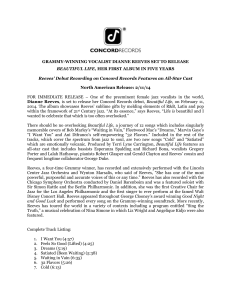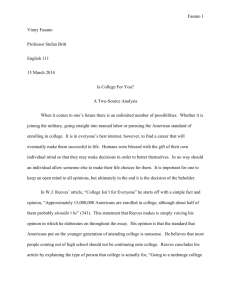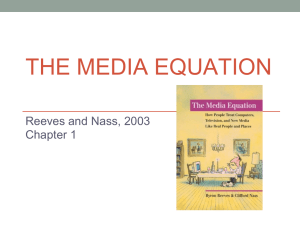Not All Workplace Vulgarities Are Created Equal
advertisement

Not All Workplace Vulgarities Are Created Equal By Angela K. Dorn, Esq. Is it okay for your employees to use vulgar language in the workplace so long as the vulgarities are not directed at a co-worker? Sure, using foul language is never ideal, but can a company be held liable for the indiscriminate "potty mouths" of its employees? According to a recent United States Court of Appeals decision, the answer to that question may depend on whether the vulgarities in question specifically address a protected class of employees. On January 20, 2010, the Eleventh Circuit Court of Appeals (which covers Alabama, Georgia, and Florida), sitting on banc, decided the case of Reeves v. C.H. Robinson Worldwide, Inc., 594 F.3d 798 (11th Cir. 2010). The Court overturned a lower court's grant of summary judgment for an employer on a former employee's claim of sexual harassment based on the foul language of her co-workers. Reeves v. C.H. Robinson Worldwide, Inc., 594 F.3d 798 (11th Cir. 2010). The court held that gender-specific vulgarity can create a hostile work environment that constitutes sexual harassment even when the offending comments are not directed towards the complaining party. When Ingrid Reeves worked for C.H. Robinson, a shipping company, she was the only woman on her floor. The employees in Ms. Reeves' work area worked in a pod of cubicles, which, because of the lack of walls, allowed Ms. Reeves to regularly overhear her male co-workers using crude and offensive language. The language Ms. Reeves heard was a near-constant stream of gender-neutral curses and gender-specific vulgar comments referencing female customers, other female employees, and females in general. However, none of the offensive language was ever directed at Ms. Reeves, and the vulgar comments (including the gender-specific derogatory comments) were directed at both males and females alike. In addition to the curses and vulgarities, Ms. Reeves' co-workers listened to a radio show that often described women in a lewd fashion, and one co-worker used a pornographic image as his computer's desktop wallpaper in plain sight of the other employees. Ms. Reeves complained about her co-workers' language to the co-workers themselves, to her supervisors, and to two C.H. Robinson executives. Nothing was done about her complaints, and her direct supervisor even joined in on or laughed at the vulgarities. The language continued unabated and almost daily until the day Ms. Reeves resigned. Ms. Reeves sued under Title VII, alleging she was a victim of hostile work environment sexual discrimination. The district court granted summary judgment for C. H. Robinson, finding that the offensive conduct Ms. Reeves complained of was not motivated by her sex because it was not directed at her in particular. The district court further reasoned that because the language was used in the presence of all employees, "both men and women were afforded like treatment." Thus, the district court concluded that Ms. Reeves was not singled out for adverse treatment on account of her sex. Ms. Reeves appealed. In overturning the district court's opinion, the Eleventh Circuit noted the extreme nature and pervasiveness of the vulgarities in Ms. Reeves' workplace, as well as the employer's failure to address Ms. Reeves' complaints. Although Title VII is "not a civility code, and not all profane or sexual language or conduct will constitute discrimination in the terms and conditions of employment," the Eleventh Circuit found that a jury could find that because C.H. Robinson failed to address Ms. Reeves' complaints, it may have adopted the comments and results as if it expressly authorized the co-workers' conduct. Moreover, even though none of Ms. Reeves' co-workers addressed their offending comments directly towards Ms. Reeves, the "harasser need not close the circle with [a] reference to the [complaining party] specifically" for the comment to be actionable under Title VII. The aspect of the court's decision employers should note is the court's distinction between "a generally vulgar workplace whose indiscriminate insults and sexually-laden conversation [do] not focus on the gender of the victim" and Ms. Reeves' workplace. If Ms. Reeves' complaints concerned only her displeasure with general, but indiscriminate and gender-neutral, vulgarities in the workplace, then she would have no recourse under Title VII. However, because a "substantial portion" of the alleged words and conduct could be seen as gender-specific, a jury could find C.H. Robinson liable for sexual harassment. The Reeves case also matters to employers because it states why it is potentially illegal for employees to be subjected to or exposed to certain types of profanity or vulgarity in the workplace. Even if the offending language is not specifically directed at the complaining party, the complaining party may have a viable claim under Title VII. Employers also should be mindful of the frequency in which potentially offensive behavior occurs in their workplace, even if the actual behavior is not severe. Notably, nothing in the Eleventh Circuit's decision limits the court's logic to gender-based Title VII claims. Employers should therefore assume that any vulgarities and derogatory language that is based on any Title VII protected class may be actionable under Title VII. Moreover, because some state courts look to Title VII cases for guidance when applying state employment discrimination laws, the court's logic could extend to protected classes covered by some state laws but not Title VII, such as sexual orientation. Employers should discourage the use of any and all vulgar comments in the workplace and have a "no tolerance" policy when it comes to gender-specific (or any protected-class-specific) vulgarity. The use of such language alone may be sufficient to establish a hostile work environment claim. As is always the case, as soon as an employer becomes aware of potential harassment, the employer has a duty to investigate the claims and to take corrective action to ensure that the harassing behavior ceases. Otherwise, the employer may face liability for the crass and vulgar language of its employees. Copyright 2010 Gonzalez Saggio & Harlan LLP


